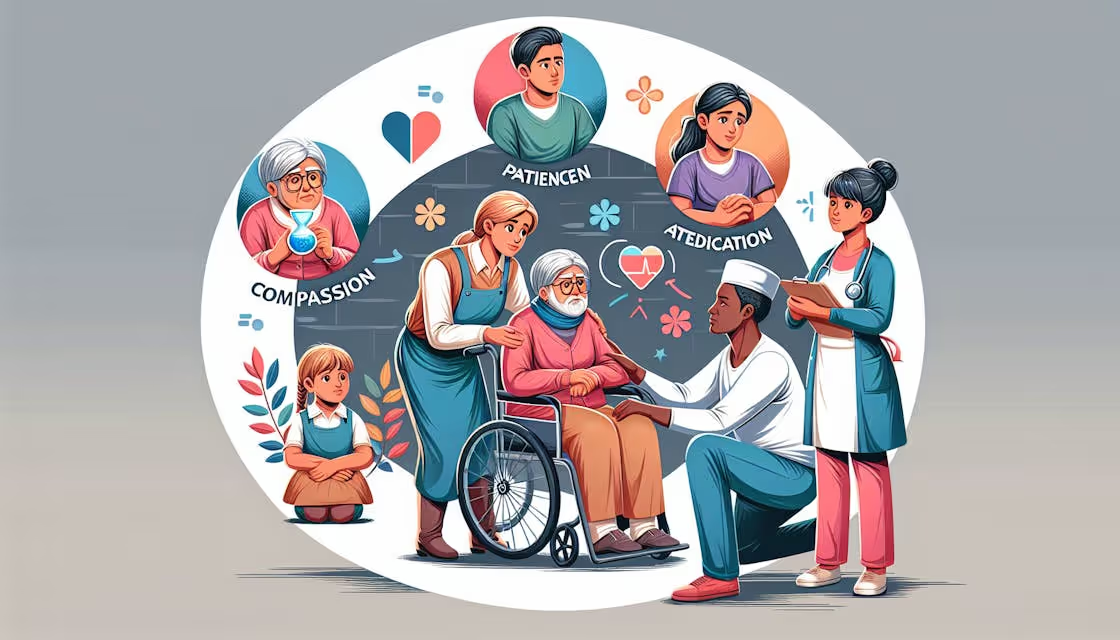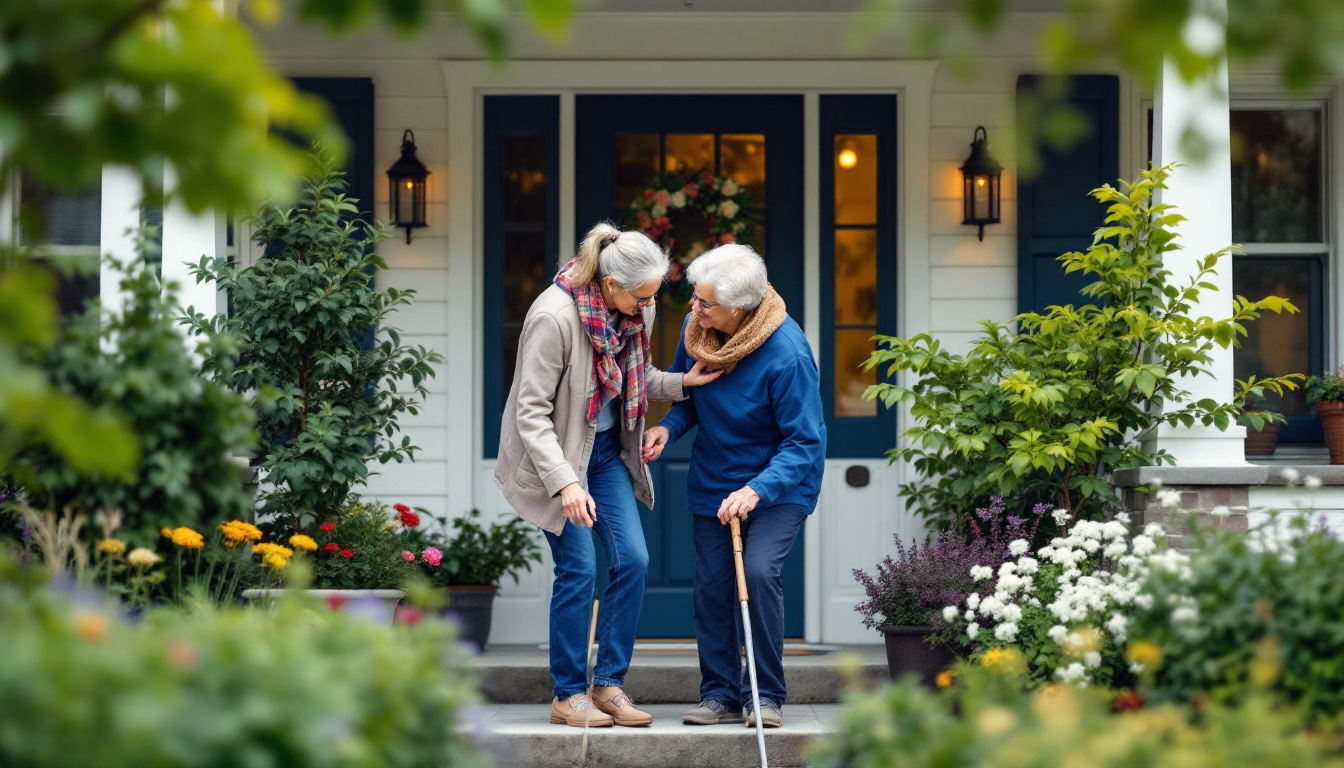What are Five Qualities of a Good Caregiver?
Uncover the Secrets of an Outstanding Caregiver. Discover the Five Qualities that Make a Difference in Caregiving.

Qualities of a Good Caregiver
When it comes to caregiving, several key qualities are essential for providing outstanding care. Two crucial qualities of a good caregiver are empathy and compassion, as well as effective communication skills.

Empathy and Compassion
Empathy is a critical quality for caregivers to possess, as it allows them to bond with the care recipient, build trust, and establish meaningful relationships. Good caregivers are empathetic, understanding, and patient. They actively listen to the care recipient, seek to understand their needs, and provide support in a kind and compassionate manner. By putting themselves in the shoes of the care recipient, caregivers can provide emotional support and create a sense of connection.
It is important to note that while empathy is crucial, caregivers can experience empathy fatigue, which can lead to burnout and negatively impact both the caregivers' mental health and the quality of care provided to the care recipient. Emotional empathy, if not balanced, can overwhelm caregivers, especially in demanding caregiving situations such as those involving dementia patients. To maintain balanced empathy, caregivers should develop self-compassion, extend kindness even when depleted, suspend judgment, broaden comfort zones, and establish boundaries. These strategies help caregivers improve and maintain balanced empathy, allowing them to provide compassionate care while prioritizing their own well-being.
Effective Communication Skills
A good caregiver demonstrates effective communication skills by being able to explain care plans clearly, being a good listener, and communicating effectively with healthcare professionals and family members involved in the care process. Effective communication is crucial for building trust and rapport with the care recipient and their family members. Caregivers need to actively listen, show respect, and maintain a positive attitude to establish rapport with patients and provide the best care possible.
By actively listening and valuing the care recipient's input, caregivers can better understand their needs, preferences, and concerns. This enables caregivers to tailor their care approach and provide personalized support. Effective communication also involves clear and concise explanations of care plans, medications, and any necessary medical information. Caregivers should be able to communicate effectively with healthcare professionals, ensuring that the care recipient's needs are properly addressed and understood.
By possessing empathy and compassion, and having effective communication skills, caregivers can provide exceptional care that not only addresses the physical needs of the care recipient but also supports their emotional well-being. These qualities are essential for building trusting relationships and creating a positive caregiving experience.
Dependability and Reliability
When it comes to caregiving, dependability and reliability are essential qualities that contribute to the overall well-being of the care recipient. Good caregivers understand the importance of consistency in caregiving duties and being punctual in medication administration. Let's explore these qualities in more detail.
Consistency in Caregiving Duties
Being consistent in caregiving duties is crucial for providing quality care. Caregivers who maintain a consistent routine help create a sense of stability and predictability for the care recipient. This consistency can include activities such as assisting with personal care, meal preparation, and household tasks.
By adhering to a consistent caregiving schedule, caregivers can ensure that the care recipient's needs are consistently met. It helps establish trust and familiarity between the caregiver and the care recipient, which is especially important for individuals who may require assistance with daily activities.
Punctuality and Medication Administration
Punctuality is another vital aspect of being a reliable caregiver. Timely administration of medications is crucial to maintaining the health and well-being of the care recipient. Caregivers should be diligent in following medication schedules, ensuring that medications are taken at the appropriate times and in the correct dosages.
In addition to medication administration, punctuality is important for attending to the various needs of the care recipient. Being on time for appointments, providing transportation, and fulfilling responsibilities in a timely manner demonstrates reliability and a commitment to the care recipient's well-being.
By being dependable and reliable, caregivers can establish trust and confidence with the care recipient and their families. This trust forms the foundation of a strong caregiver-care recipient relationship, enabling effective communication and better overall care.
It is important to note that dependability and reliability extend beyond just fulfilling caregiving duties. Caregivers should also be proactive in addressing any concerns or changes in the care recipient's condition, and communicate effectively with the care recipient and their healthcare team.
By embodying the qualities of dependability and reliability, caregivers play a vital role in ensuring the care recipient's overall health and well-being. They provide a sense of stability, consistency, and trust, making a significant difference in the lives of those they care for.
Observant and Anticipatory
A good caregiver possesses the qualities of being observant and anticipatory, allowing them to provide exceptional care to individuals in need. By being vigilant and perceptive, caregivers can recognize changes in health conditions and respond to emotional states promptly.
Recognizing Changes in Health Conditions
One of the crucial qualities of a good caregiver is the ability to spot changes in the health conditions of those under their care. By staying observant, caregivers can identify signs and symptoms that may indicate a shift in the individual's health status. This attentiveness enables them to take appropriate action, such as notifying healthcare professionals or adjusting care plans accordingly.
Being knowledgeable about the specific health conditions of the care recipient is essential for recognizing changes. Caregivers should familiarize themselves with the typical symptoms and complications associated with the individual's condition. Regularly monitoring vital signs, physical appearance, and behavior can aid in early detection of any deviations from the norm.
Responding to Emotional States
In addition to physical health, good caregivers are attuned to the emotional well-being of those they care for. They are skilled at recognizing and understanding the emotional states of individuals and responding empathetically.
Emotional states can vary widely depending on the situation, and caregivers must be able to adapt their approach accordingly. They should be sensitive to cues like changes in behavior, mood swings, or expressions of distress. By actively listening and providing emotional support, caregivers can help alleviate anxiety, loneliness, or other negative emotions that may arise.
Responding to emotional states also involves providing comfort and reassurance. Caregivers can create a calming environment, engage in meaningful conversations, and offer companionship to individuals who may be experiencing emotional challenges.
By being observant and anticipatory, caregivers can ensure the well-being and overall satisfaction of those they care for. Recognizing changes in health conditions and responding to emotional states with empathy and compassion are vital aspects of providing exceptional care.
Respect for Dignity and Autonomy
When it comes to caregiving, one of the fundamental qualities of a good caregiver is the respect for the care recipient's dignity and autonomy. Providing care in a way that upholds these principles is essential for maintaining a positive and empowering caregiving relationship. Let's explore two key aspects of this quality: involving the care recipient in decision-making and upholding their independence and privacy.
Involving Care Recipient in Decision-Making
A good caregiver recognizes and respects the importance of involving the care recipient in decision-making processes. This includes seeking their input, considering their preferences, and empowering them to make choices regarding their own care. Involving the care recipient in decision-making not only helps to maintain their sense of autonomy but also enhances their overall well-being.
By actively involving the care recipient in decision-making, caregivers can foster a sense of ownership and control over their own lives. This can be achieved by discussing treatment options, care plans, and daily routines with the care recipient. By understanding their desires, values, and goals, caregivers can tailor the care provided to align with their individual needs.
Upholding Independence and Privacy
Respecting the care recipient's dignity also means upholding their independence and privacy. Good caregivers understand the importance of allowing the care recipient to maintain their sense of self and personal space. This involves providing support and assistance when needed, while also promoting independence and autonomy whenever possible.
Respecting privacy is crucial in maintaining the dignity of the care recipient. Caregivers should create a safe and private environment where the care recipient feels comfortable and respected. This includes maintaining confidentiality, ensuring privacy during personal care activities, and respecting their personal boundaries.
By upholding independence and privacy, caregivers can foster a sense of respect and dignity in the care recipient. This not only enhances their quality of life but also promotes a positive and trusting caregiver-care recipient relationship.
In summary, a good caregiver demonstrates respect for the care recipient's dignity and autonomy by involving them in decision-making processes and upholding their independence and privacy. By doing so, caregivers create an environment that promotes empowerment, respect, and a sense of self-worth for the care recipient.
The Benefits and Challenges of Caregiving
Being a caregiver comes with both benefits and challenges. Understanding these aspects can help individuals navigate the caregiving journey more effectively.
Fulfillment in Helping Others
One of the key benefits of being a caregiver is the fulfillment that comes from helping others, especially those in need of care. Caregivers have the opportunity to make a meaningful difference in the lives of those they care for, allowing them to stay in their homes and maintain as much independence as possible. By providing necessary support and care, caregivers can positively impact someone's life and contribute to their overall well-being.
The act of caregiving can also lead to personal growth and development. It offers a chance to develop empathy, compassion, and patience, qualities that can be valuable in both personal and professional relationships. Being able to provide care and support to someone in need can be immensely rewarding, creating a sense of purpose and fulfillment [4].
Balancing Personal and Professional Life
Balancing personal and professional life can be a significant challenge for caregivers. The commitment of time and energy required to provide care for an aging or sick loved one can be substantial. Caregivers must possess deep wells of patience, compassion, and empathy to effectively care for their loved ones [5]. It's important to recognize that caregiving can be emotionally and physically demanding, and caregivers should be prepared for both the joys and frustrations that come with it.
To maintain a healthy balance, caregivers should prioritize self-care. This includes recognizing their limits, asking for help when needed, and utilizing available resources. Support services like home care and respite care can provide caregivers with temporary relief and an opportunity to recharge. Taking care of their own well-being enables caregivers to continue providing quality care to their loved ones.
Mindfulness and self-awareness are also essential for caregivers. Being aware of their own feelings and recognizing triggers for frustration and impatience can help caregivers respond to difficult circumstances in a more positive and controlled manner. Practicing mindfulness can lead to personal growth and healing in the caregiving journey.
Understanding the benefits and challenges of caregiving is crucial for individuals considering or currently in the role of a caregiver. By recognizing the fulfillment that comes from helping others and being aware of the challenges that may arise, caregivers can approach their responsibilities with greater resilience and find a balance between their personal and professional lives.
The Importance of Effective Caregiver Communication
Effective communication is a vital quality for caregivers as it forms the foundation for building trust and rapport with patients and their families. Good caregivers possess empathy, patience, and excellent communication skills, which are crucial for establishing meaningful connections and providing high-quality care.
Building Trust and Rapport
Building trust and rapport is essential in caregiving. Caregivers need to actively listen, show respect, and maintain a positive attitude to establish a strong bond with their patients. By demonstrating empathy and understanding, caregivers can create a safe and supportive environment where patients feel comfortable expressing their needs and concerns.
To build trust and rapport, caregivers should:
- Practice active listening: By giving their full attention to patients, caregivers can listen attentively and empathetically. This helps to create a sense of validation and comfort, allowing patients to share their thoughts and emotions openly.
- Show respect: Treating patients with dignity and respect is crucial. Caregivers should be mindful of their tone, body language, and choice of words. Respecting the autonomy and preferences of patients helps foster trust and a positive caregiving relationship.
- Maintain a positive attitude: A positive and compassionate demeanor can greatly impact patient well-being. By displaying empathy, caregivers can instill a sense of hope and reassurance, fostering an environment conducive to healing and overall satisfaction.
Active Listening and Respect
Active listening is a key aspect of effective caregiver communication. It involves fully engaging with patients, paying attention to their verbal and non-verbal cues, and responding thoughtfully. Active listening demonstrates care and empathy, allowing caregivers to better understand patients' needs and provide appropriate support.
Additionally, caregivers should show respect throughout their interactions. This involves using simple language to enhance understanding, speaking at the patient's level to keep them engaged, and making eye contact to facilitate understanding and build trust. Avoiding distractions and paying attention to body language are also important aspects of respectful communication.
By prioritizing effective communication, caregivers can establish a strong foundation of trust, foster meaningful relationships, and provide the best possible care for their patients. Active listening, respect, and empathy are key qualities that contribute to the overall well-being and satisfaction of both the caregiver and the care recipient.
Adaptability and Resilience
Caregiving is a dynamic and demanding role that requires caregivers to be adaptable and resilient. They often encounter diverse patient needs and work within ever-evolving healthcare environments. Let's explore two crucial qualities of adaptability and resilience in caregivers: handling diverse patient needs and practicing self-care to prevent burnout.
Handling Diverse Patient Needs
Good caregivers are adaptable to the unique needs and conditions of their patients. They possess the ability to quickly adjust their caregiving approach, problem-solve, and provide the necessary support. Being adaptable allows caregivers to cater to the specific requirements of each patient, whether it's assisting with daily activities, providing emotional support, or managing medical treatments.
To effectively handle diverse patient needs, caregivers should continuously seek education and training to enhance their skills and stay updated on best practices. This ongoing learning helps them provide the most effective care in a constantly evolving healthcare landscape. By staying informed and adaptable, caregivers can deliver personalized care that meets the changing needs of their patients.
Practicing Self-Care and Preventing Burnout
Resilience is another essential quality for caregivers. It involves self-awareness, self-care, and the ability to cope with stress and maintain a high level of care for their patients, while also caring for themselves. Caregiving can be emotionally and physically demanding, often requiring an enormous commitment of time and energy. It's crucial for caregivers to prioritize their well-being to prevent burnout and provide sustainable care.
Practicing self-care involves setting boundaries, seeking support from others, and engaging in activities that promote relaxation and rejuvenation. By taking care of their own physical, mental, and emotional well-being, caregivers can maintain their resilience and continue to provide quality care to their loved ones. It's important for caregivers to remember that by taking care of themselves, they are better equipped to care for others.
Caregivers may face moments where they may lose patience or feel overwhelmed, but it's essential for them to be kind to themselves and learn from these experiences. Acknowledging slip-ups as opportunities for growth can help maintain patience, compassion, and resilience for both the caregiver and their loved one in their care. Building a strong support system, seeking respite care when needed, and practicing self-compassion are all vital aspects of maintaining resilience in the face of caregiving challenges.
By being adaptable and resilient, caregivers can navigate the diverse needs of their patients and maintain their well-being in the caregiving journey. These qualities empower caregivers to provide the highest level of care while adapting to the changing circumstances and promoting their own self-care.
References
- https://www.vnshealth.org/patient-family-support/health-library/best-qualities-of-a-good-caregiver/
- https://www.seacarehomecare.com/resources/what-caregivers-should-know-about-empathy-and-their-own-mental-health
- https://providencehcare.com/7-must-have-qualities-of-a-good-caregiver/
- https://companionsforseniors.com/2020/04/patience-empathy-compassion-caregivers/
- https://www.homecare-aid.com/10-communication-tips-to-be-a-successful-caregiver/




























































































